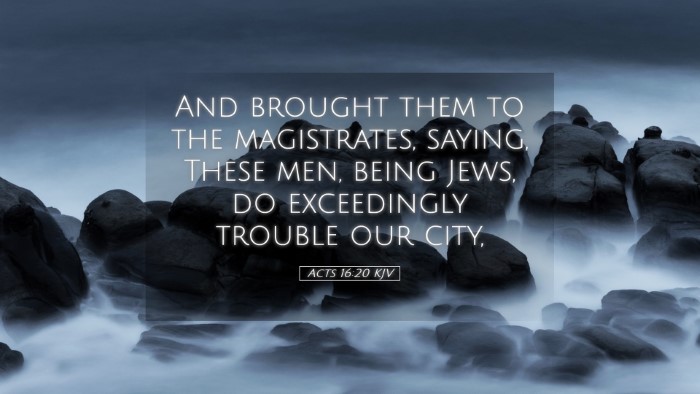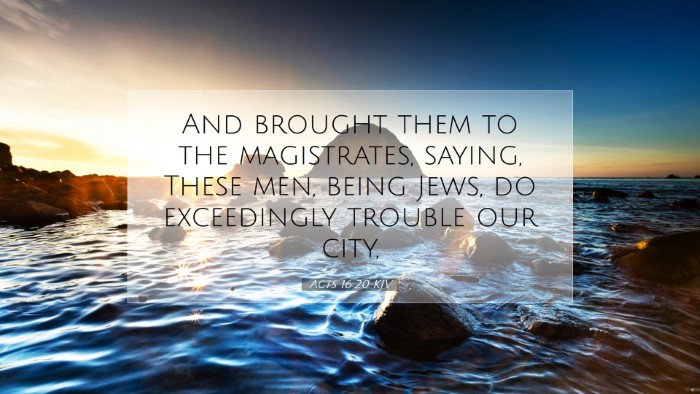Commentary on Acts 16:20
In Acts 16:20, we encounter a pivotal moment in the life of the Apostle Paul during his second missionary journey. This verse reads:
“And brought them to the magistrates, saying, These men, being Jews, do exceedingly trouble our city.” (Acts 16:20, KJV)
Contextual Background
The setting is Philippi, a Roman colony in Macedonia. Paul, along with Silas, had recently returned from a mission to preach the Gospel. The city was predominantly Gentile, but their preaching faced immediate opposition. The success of their ministry started to disturb the local economy, particularly the influence of slave owners who profited from a demon-possessed servant girl.
Analysis of the Verse
The statement made by the slave owners is significant. They issue specific charges against Paul and Silas, emphasizing their Jewish identity and their perceived threat to the status quo.
Jewish Identity
“These men, being Jews…” This initial assertion serves multiple purposes. First, it highlights the ethnic tension present within the Roman Empire, where Jews were sometimes viewed with suspicion and hostility.
Matthew Henry notes that the slave owners not only utilized Paul’s and Silas’s Jewish background to incite a riot but also leveraged socio-political fears to gain favor from the magistrates who were likely biased against Jewish individuals (Henry).
Disturbance in the City
The phrase “do exceedingly trouble our city” indicates the significant impact Paul and Silas's ministry had on Philippi. Their growing influence was perceived as a threat to the local order, which revolved around social and economic stability.
Albert Barnes expands on this idea, asserting that the spiritual and moral transformations initiated by Paul could disrupt established norms and practices, especially regarding idolatry and commerce (Barnes).
Legal Implications
The appeal to the magistrates signifies a strategic move to utilize legal authority as a means of suppressing the Gospel's advance. The slave owners’ accusations are more than personal grievances; they reflect a calculated attempt to enforce patriarchal legal structures against disruptive influences.
Adam Clarke comments on the early Christians’ challenges, proposing that such public accusations against Paul represent broader persecutions faced by the Church, which were often exacerbated by social and economic motivations (Clarke).
Theological Reflections
This verse encapsulates key themes in the overarching narrative of Acts. The tension between the proclamation of the Gospel and societal norms invites deeper theological reflection among scholars.
Witness and Opposition
Paul and Silas exemplify the early church's witness amid opposition. Their commitment to preaching leads to personal suffering, yet their responses, subsequent actions, and reliance on divine providence showcase the transformative power of the Gospel.
Matthew Henry encourages students of the Bible to consider how this passage illustrates the resilience of faith in the face of adversity (Henry).
Cultural Context
The cultural dynamics at play also provide a rich field for exploration regarding early church identity among both Jews and Gentiles. Understanding the socio-political climate helps in interpreting how the message of Christ was sometimes embraced and at other times vehemently opposed.
Albert Barnes further articulates that the disrupting nature of the Gospel does not merely cause trouble but is also indicative of the kingdom of God challenging prevailing systems of injustice (Barnes).
Pastoral Applications
For pastors and theological students, Acts 16:20 serves as a poignant reminder of the challenges faced when engaging in witness—the balance between proclaiming truth and navigating societal structures.
Encouragement in Challenge
Just as Paul and Silas faced accusations, modern believers may find themselves at odds with societal expectations.
Pastoral leaders can recognize that opposition may often arise due to the transformative nature of the Gospel and encourage their congregations to persevere in faithfulness.
Call to Action
This verse calls for self-examination within church leadership regarding how they address justice, community challenges, and the pursuit of the Gospel's mission. It can motivate leaders to engage thoughtfully with cultural issues while remaining steadfast in their theological commitment.
Conclusion
Acts 16:20, thus, encapsulates a moment of great significance within the early church’s narrative, elucidating the dynamics of faith amidst hostility. The insights drawn from public domain commentaries reveal the depth of this text, offering invaluable perspectives for contemporary readers, pastors, and scholars alike.


